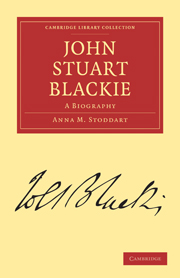Book contents
- Frontmatter
- PREFACE TO THE FIRST EDITION
- Contents
- CHAPTER I PARENTAGE AND CHILDHOOD. 1809–1819
- CHAPTER II AT SCHOOL AND COLLEGE. 1820–1829
- CHAPTER III STUDENT LIFE IN GÖTTINGEN. 1829
- CHAPTER IV STUDENT LIFE IN BERLIN. 1829–1830
- CHAPTER V ROME. 1830–1831
- CHAPTER VI END OF WANDERJAHRE. 1831–1832
- CHAPTER VII YEARS OF STRUGGLE. 1832–1837
- CHAPTER VIII THE TEST ACTS. 1837–1840
- CHAPTER IX INSTALLATION AND MARRIAGE. 1841–1842
- CHAPTER X ABERDEEN AND UNIVERSITY REFORM. 1842–1850
- CHAPTER XI ‘ÆSCHYLUS’ AND THE GREEK CHAIR. 1850–1852
- CHAPTER XII EDINBURGH. 1852–1857
- CHAPTER XIII LAYS, LECTURES, AND LYRICS. 1857–1860
- CHAPTER XIV HOMER. 1861–1866
- CHAPTER XV THE HIGHLANDS AND ISLANDS. 1866–1870
- CHAPTER XVI PILGRIM YEARS. 1870–1872
- CHAPTER XVII ‘SELF-CULTURE.’ 1873–1874
- CHAPTER XVIII THE CELTIC CHAIR. 1875–1876
- CHAPTER XIX EGYPT. 1876–1879
- CHAPTER XX RETIREMENT FROM THE GREEK CHAIR. 1880–1882
- CHAPTER XXI CLASS-ROOM AND PLATFORM. 1841–1882
- CHAPTER XXII RECREATIONS OF AN EMERITUS PROFESSOR. 1882–1887
- CHAPTER XXIII “LIVING GREEK.” 1888–1891
- CHAPTER XXIV CLOSING YEARS. 1892–1895
- INDEX
CHAPTER XVII - ‘SELF-CULTURE.’ 1873–1874
Published online by Cambridge University Press: 05 October 2010
- Frontmatter
- PREFACE TO THE FIRST EDITION
- Contents
- CHAPTER I PARENTAGE AND CHILDHOOD. 1809–1819
- CHAPTER II AT SCHOOL AND COLLEGE. 1820–1829
- CHAPTER III STUDENT LIFE IN GÖTTINGEN. 1829
- CHAPTER IV STUDENT LIFE IN BERLIN. 1829–1830
- CHAPTER V ROME. 1830–1831
- CHAPTER VI END OF WANDERJAHRE. 1831–1832
- CHAPTER VII YEARS OF STRUGGLE. 1832–1837
- CHAPTER VIII THE TEST ACTS. 1837–1840
- CHAPTER IX INSTALLATION AND MARRIAGE. 1841–1842
- CHAPTER X ABERDEEN AND UNIVERSITY REFORM. 1842–1850
- CHAPTER XI ‘ÆSCHYLUS’ AND THE GREEK CHAIR. 1850–1852
- CHAPTER XII EDINBURGH. 1852–1857
- CHAPTER XIII LAYS, LECTURES, AND LYRICS. 1857–1860
- CHAPTER XIV HOMER. 1861–1866
- CHAPTER XV THE HIGHLANDS AND ISLANDS. 1866–1870
- CHAPTER XVI PILGRIM YEARS. 1870–1872
- CHAPTER XVII ‘SELF-CULTURE.’ 1873–1874
- CHAPTER XVIII THE CELTIC CHAIR. 1875–1876
- CHAPTER XIX EGYPT. 1876–1879
- CHAPTER XX RETIREMENT FROM THE GREEK CHAIR. 1880–1882
- CHAPTER XXI CLASS-ROOM AND PLATFORM. 1841–1882
- CHAPTER XXII RECREATIONS OF AN EMERITUS PROFESSOR. 1882–1887
- CHAPTER XXIII “LIVING GREEK.” 1888–1891
- CHAPTER XXIV CLOSING YEARS. 1892–1895
- INDEX
Summary
The winter's leisure was spent in getting into brief emphatic expression the Professor's many thoughts upon the formation of a well-balanced manhood, which his long acquaintance with young men, and his observation of their tendency to turn from sanity and righteousness at the call of any “philosophy and vain deceit, after the tradition of men, after the rudiments of the world,” had suggested. He noticed to what class of character each beguiling call appealed, and he endeavoured—by a book which might serve as a rallying cry to all open-minded readers—to summon them back to the right starting-point.
Some exception has been taken to the title of this little volume. “Self-culture,” it has been urged, means self-worship; but the objection is pedantic, and the term conveys correctly the writer's meaning. Mind, body, and spirit go to form a human being, and each needs recognition, instruction, education, to interfuse its influence with the others into integral health and symmetry. The Professor, himself of sane mind and wholesome habits, loving life for all its joys and lessons, having learned, in reverence for God the creator and provider, and in communion with His Spirit, how momentous a gift is this of life, impressed in wise words upon the young the right attitude toward life, the right use to be made of its opportunities. “Having,” he says, “by the golden gift of God the glorious lot of living, let us endeavour to live nobly.”
His counsel is conveyed in brief, apt, and vivid expression. Ko dull reiteration saps the interest with which we read the little book.
- Type
- Chapter
- Information
- John Stuart BlackieA Biography, pp. 281 - 298Publisher: Cambridge University PressPrint publication year: 2010First published in: 1896



